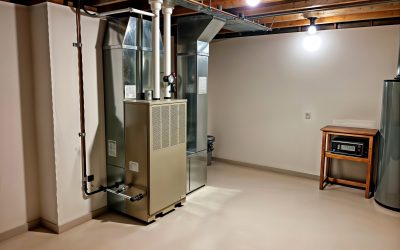HVAC systems move air through various components like ducts, coils, and filters, which can collect dust, moisture, and debris over time. When these materials accumulate or burn off, they can produce noticeable odors. While some may be harmless and temporary, others may signal mold growth, electrical issues, or gas leaks. Ignoring these HVAC smells can lead to machine damage, health risks, or even fire hazards.
Here are seven common odors that signal something may be wrong:
1. Burning
A burning smell usually indicates that dust has settled on heating components during periods of inactivity. This is especially common when turning on the heat for the first time in months. While a faint smell for a few minutes can be normal, a persistent burning odor may indicate overheated components.
If the smell lasts more than a few minutes, shut off your equipment immediately and have it inspected by an HVAC technician as soon as possible. Avoid running the unit until the cause is identified, as continued operation may cause further damage.
2. Rotten Egg or Sulfur
A sulfurous or rotten egg smell in your HVAC system is often a sign of a natural gas leak. Utility companies add a chemical called mercaptan to gas lines to give this dangerous gas a strong, easily identifiable scent. This is a serious issue and should never be ignored, as natural gas leaks can lead to explosions.
If you smell this odor, turn off the setup and evacuate the area immediately. Avoid using electronics or turning on lights, as even a small spark could ignite the gas. Call your gas provider or emergency services from outside the building.
3. Musty or Moldy
A musty smell is often caused by mold or mildew growth inside the ductwork. Excess humidity, clogged drain lines, and standing water can create the ideal environment for microbial growth, especially in the evaporator coil or drain pan.
You’ll need a professional to inspect and clean the affected components. This may involve duct cleaning, clearing clogged condensate lines, or treating mold-affected areas. Installing a dehumidifier or improving ventilation can also prevent future moisture buildup.
4. Chemical or Acetone
One of the more serious HVAC smells to watch for is a chemical-like odor, signaling that your unit may have a refrigerant leak. Refrigerants are used in the cooling cycle, and when they leak, they reduce efficiency and pose health and environmental risks.
Shut off your system and call a technician immediately if you suspect a refrigerant leak. Only certified professionals can safely locate and repair refrigerant lines, recharge the equipment, and ensure it operates within safe limits.
5. Sewage or Foul Drain
A sewage or foul drain smell emanating from your vents may be caused by an improperly sealed floor drain near the machine. When P-traps dry out, they allow gases to travel up into the property and be distributed by the air handler.
Start by pouring water down the floor drain to refill the P-trap. If the smell persists, a plumber may need to check the drain infrastructure for blockages or venting issues. Your contractor can inspect the ductwork to ensure no leaks are pulling in foul-smelling air.
6. Gunpowder or Ozone
A gunpowder-like or sharp ozone smell usually indicates an electrical malfunction inside the machine. Common causes include a shorted control board, an overheating blower motor, or a failing capacitor. These issues can cause internal components to overheat or burn.
Turn off the equipment right away and have it inspected by a qualified HVAC technician. Don’t attempt to restart the unit until the cause of the smell has been identified and repaired.
7. Dead Pest
If you notice a strong, decaying odor stemming from your unit, it may be due to a rodent or small animal that has died inside. They can sometimes enter machines looking for warmth, especially in colder months, but may get trapped and die inside the ductwork.
To fix this, a professional will need to locate and remove the carcass, then clean and sanitize the affected areas. You can also install screens and seal gaps around your HVAC infrastructure to keep animals from entering in the future.
Schedule Your HVAC Inspection Today
HVAC smells are often a sign that something isn’t working as it should. From electrical issues to mold or gas leaks, these odors can pose risks if ignored. Clarksville Heating & Air provides trusted HVAC service to keep your property safe and comfortable.
Catch small issues before they become big repairs! Contact us today.







